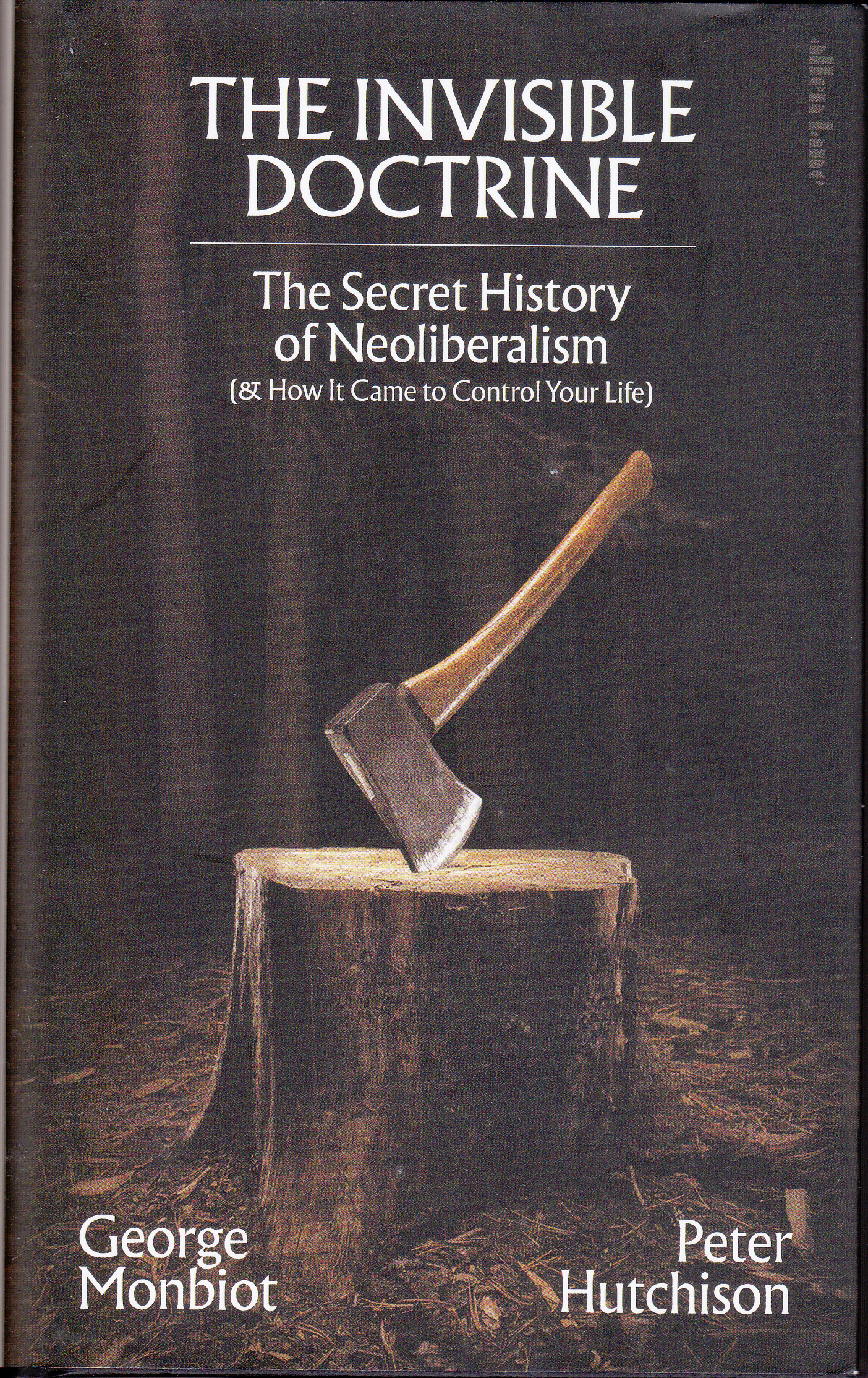Book Review: The Invisible Doctrine - The Secret History of Neoliberalism (& How it Came to Control Your Life)
Written by: Duncan B. on 15 August 2024
 The Invisible Doctrine. The Secret History of Neoliberalism (& How It Came To Control Your Life) by George Monbiot and Peter Hutchison is a small book in size and length (162 pages plus endnotes), but it gives an excellent summary of the history of neoliberalism and its origins in the 1930s in the theories of economists such as Friedrich Hayek.
The Invisible Doctrine. The Secret History of Neoliberalism (& How It Came To Control Your Life) by George Monbiot and Peter Hutchison is a small book in size and length (162 pages plus endnotes), but it gives an excellent summary of the history of neoliberalism and its origins in the 1930s in the theories of economists such as Friedrich Hayek.
Neoliberalist policies advocate the relaxation of financial controls, privatisation of public services and utilities, reduction in taxes on the wealthy and reduction of social services. Neoliberalism seeks total freedom for capitalists to do whatever they want, free from trade unions, labour laws, environmental regulations or any other restraint on capitalism.
Neoliberalism was quickly accepted by many big corporations such as General Motors, and widely promoted by supposedly independent think tanks. Reagan in the US and Thatcher in the UK adopted neoliberalism whole-heartedly. Neoliberal policies were carried out to their fullest extent in Chile after Pinochet’s coup in 1973, enforced by Pinochet’s fascist dictatorship. The short time as Prime Minister of the UK by Truss, and Trump’s presidency of the US are modern examples of neoliberalism in action.
The Invisible Doctrine exposes how the promoters of neoliberalism hide their activities behind a smokescreen of conspiracy theories, culture wars and phoney environmental campaigns. We are currently seeing one of these in Australia, being whipped up by the National Party to try to get farmers to oppose wind farms, solar power sites and the transmission lines which they require.
The book’s scope does not cover neoliberalism in Australia, but Australians have suffered from the adoption of neoliberal policies by a succession of both Labor and Liberal governments.
The damage from neoliberalism reached its peak in Victoria under the Kennett Liberal government (1992-1999 ). Victoria suffered from the privatisation of the State Electricity Commission, public transport and other utilities and the forced amalgamation of local councils. Thousands of workers lost their jobs and Victorians continue to experience higher prices and worse levels of service as a result.
The Invisible Doctrine offers a wealth of information about neoliberalism, but offers little in the way of solutions. The authors propose to “enhance democracy” through what they call “deliberative participatory democracy.” This sees people coming together in community assemblies at the municipal level to make decisions about their communities. These theories of course offer no challenge to capitalism. Only the workers and their allies engaging in revolutionary struggle can overthrow capitalism.
The CPA (M-L) fighting Programme gives us a way forward in uniting the people in opposition to the harmful effects of neoliberal policies on the Australian people.
Print Version - new window Email article
-----
Go back
Independence from Imperialism
People's Rights & Liberties
Community and Environment
Marxism Today
International
Articles
| Public sector workers take on SA government |
| Courts uphold government attack on militant union |
| Support BAE shipworkers’ action for same job, same pay |
| Labor Sweeps to Power: Now It’s Time to Deliver for Workers |
| Dystopia and the Sacrosanct Elephant |
| Workers Strike at PepsiCo's Snack Foods Factory - An Example of The Leading Class In Action |
| ALBANESE DEFINES LABOR PARTY - "MAINSTREAM" and "REFORMIST NOT REVOLUTIONARY" |
| May Day Greetings from CPA (M-L) |
| NSW construction workers to march on May 1 |
| The Not-So Curious Incident of Low Wages Growth - Peetz report |
| VALE Wallace McKitrick: cultural fighter (1950-2025) |
| Don’t leave politics to the politicians! |
| SA Government Workers in Action in Struggle Against Rising Cost of Living |
| 8th March - International Women’s Day - Salute Women’s Struggle |
| Book Review: Culture and Imperialism |
| A Capitalist Parliament Won’t Get People Out of the Mess - Mass Struggle for People’s Power the only Solution to the Crisis |
| Unions say "Don't risk Dutton" but avoid issues of substance |
| Canberra airport guards fight for job security while overseas owned security contractors compete in "race to the bottom" at privatized airports |
| Union membership and workers’ struggle |
| Woolworths Warehouse Workers' Strike Shows Strength of United Workers |
-----
